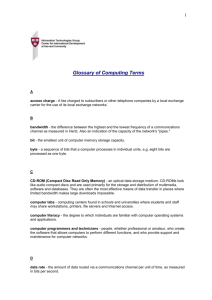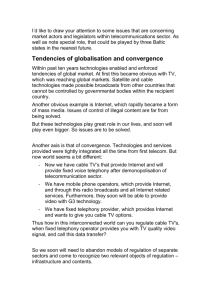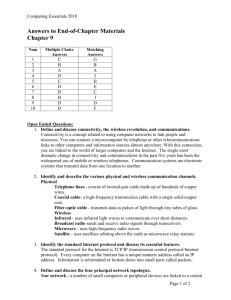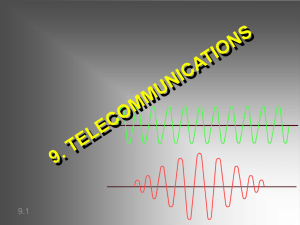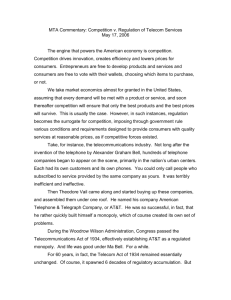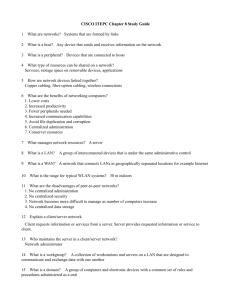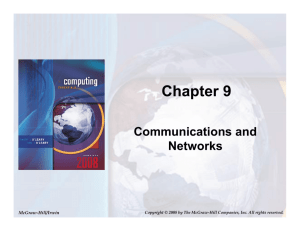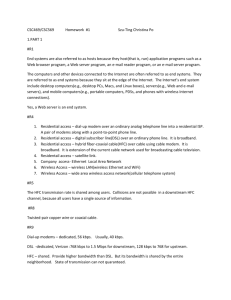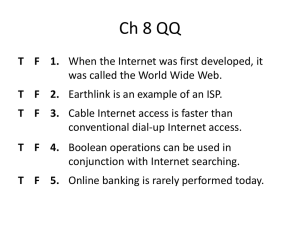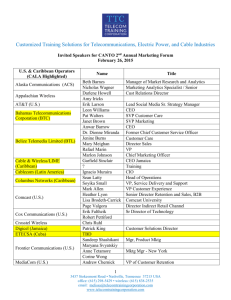1 Glossary of Telecommunications Terms A analog signal
advertisement
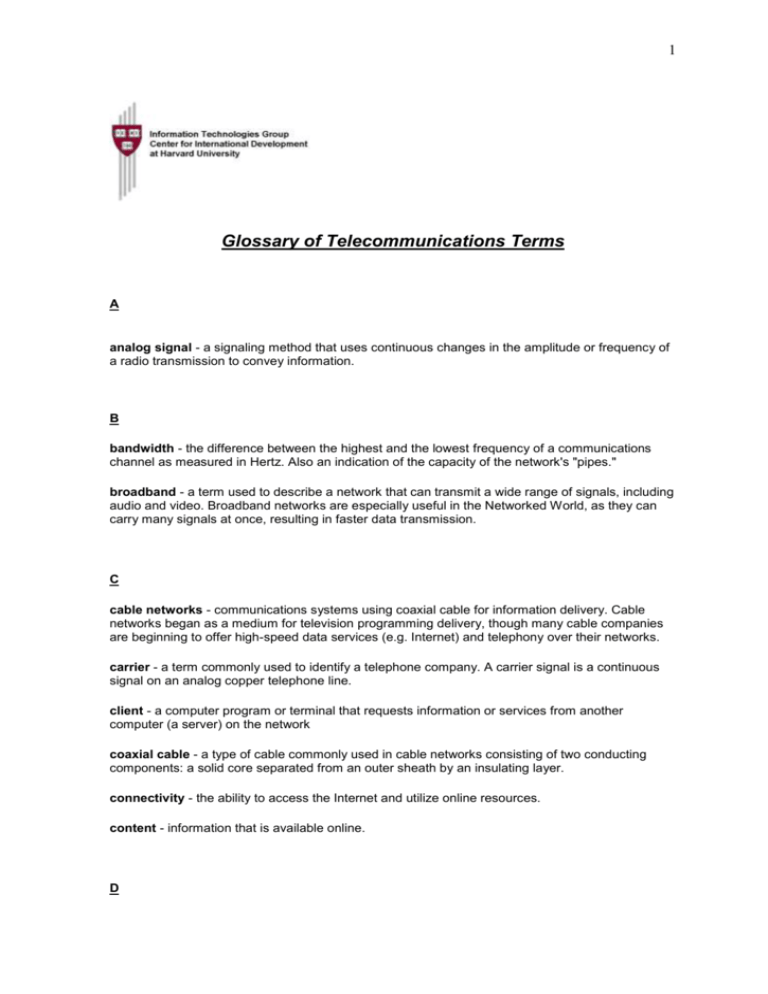
1 Glossary of Telecommunications Terms A analog signal - a signaling method that uses continuous changes in the amplitude or frequency of a radio transmission to convey information. B bandwidth - the difference between the highest and the lowest frequency of a communications channel as measured in Hertz. Also an indication of the capacity of the network's "pipes." broadband - a term used to describe a network that can transmit a wide range of signals, including audio and video. Broadband networks are especially useful in the Networked World, as they can carry many signals at once, resulting in faster data transmission. C cable networks - communications systems using coaxial cable for information delivery. Cable networks began as a medium for television programming delivery, though many cable companies are beginning to offer high-speed data services (e.g. Internet) and telephony over their networks. carrier - a term commonly used to identify a telephone company. A carrier signal is a continuous signal on an analog copper telephone line. client - a computer program or terminal that requests information or services from another computer (a server) on the network coaxial cable - a type of cable commonly used in cable networks consisting of two conducting components: a solid core separated from an outer sheath by an insulating layer. connectivity - the ability to access the Internet and utilize online resources. content - information that is available online. D 2 data rate - the amount of data routed via a communications channel per unit of time, as measured in bits per second. digitalization - in a human context, digitalization refers to the integration of digital technologies (i.e. ICTs) into the everyday lives of people in a community. domain name - a string of words used to identify computer addresses on the Internet. Commonly points to the top level of a World Wide Web site on a host machine. download - to transfer data or files from a server on the Internet to a user's computer. DSL (Digital Subscriber Line) - A high-bandwidth Internet access service offered by some ISPs and telecom operators. DSL incorporates existing copper telephone lines with a specialized modem at the customer's end and a multiplexer at the central office. Allows for simultaneous voice and always-on data transmission. DSL services are being rolled out first in metropolitan areas with subscriber bases that can best support the required network upgrades. E e-mail (electronic mail) - a computer-based form of sending and receiving messages via the Internet. Users may have their own e-mail account or use a shared account, which is quite common in the developing world. e-commerce (electronic commerce) - business transactions which incorporate the use of ICTs to enhance interactions and exchanges, and which augment or replace physical contact or exchanges. electrical grid - the network of power lines used to deliver electricity to inhabited areas. F fiber optics - cables made from bundles of glass or plastic fibers for high-bandwidth data transfer using beams of light carrying electromagnetic signals. frame relay - a telecommunications technology for the internetworking of local area net works (LANs). Frame relay may be carried over a variety of lines, including fiber optics and ISDN. I Information Age - the current stage in societal development which began to emerge at the end of the twentieth century. This period is marked by the increased production, transmission, consumption of and reliance on information. Many consider the new role of information to be changing our social and economic behavior as dramatically as did the Industrial Revolution. information and communication technologies (ICTs) - the building blocks of the Networked World. ICTs include telecommunications technologies, such as telephony, cable, satellite and radio, as well as digital technologies, such as computers, information networks and software. 3 interactive - providing output based on input from the user. This output feeds back into the user's decision process for subsequent interaction. Interactive websites, for instance, allow for more dynamic information browsing and applications such as shopping, banking, etc. interconnection fees - fees that the operator of one network (e.g. a telephone system) must pay another network operator to in order to connect to that network. The connection might be to terminate a call initiated on the former network (usually charged on a per call basis), or to access the international Internet backbone (usually a lump-sum charge). Internet - An open network layer that allows for the interconnection of various data networks through the use of the TCP/IP protocol. When most individuals think of the Internet, they are thinking of applications that use the Internet, such as e-mail and the World Wide Web. Internet cafes - public establishments offering access to Internet-enabled terminals in addition to other services, such as food and drink. Also known as cybercafes and online cafes. ISDN (Integrated Services Digital Network) - a high-speed communications network which combines voice, data and video into single cables. ISP (Internet Service Provider) - A company which offers Internet access (and possibly other services such as e-mail and webhosting) to individuals or companies through either temporary or dedicated connections. K Kbps (Kilobits per second) - a unit for measuring the speed of transmission in a digital connection; one thousand bits of data per second. L LAN (Local Area Network) - a group of computer workstations connected to one or more common servers for the sharing of files, printing services and Internet access. Usually found in offices and schools. M Mbps (Megabits per second) - a unit for measuring the speed of transmission in a digital connection; one million bits of data per second. mobile wireless - wireless telephony which allows for the movement of end-user equipment. Mobile wireless networks are set up as a grouping of base stations, each with its own coverage "cell." It is this concept that gave rise to the term "cellular phone." modem - abbreviation for "modulator/demodulator." Modems allow the transmission of data between computers (digital devices) over analog lines. Modems are required for connectivity where broadband services are unavailable. 4 multiplexer - a device which aggregates transmission channels on a single medium, such as a telephone line or radio spectrum, and enables the sharing of these resources for more efficient bandwidth allocation. N network infrastructure - this term refers to the architecture, in terms of equipment and connections, that makes up a network. network interface - the means by which users access a network for the purposes of communicating across it or retrieving information from it. O online - describes a person using the Internet or a resource that is available over the network. operator - a telephone company; a business that provides telecommunications services. P packet loss - an error that occurs when data networks are overly congested. When pieces of data ("packets") are unable to be transmitted, they are sometimes "thrown out" by the network. Packet loss may or may not be disruptive to the recipient of the data, depending on the severity of loss. piracy - the unauthorized duplication of goods protected by intellectual property law (e.g. copying software unlawfully). proxy - a server setup designed to offer either firewall security or faster access to cached content normally accessible only through slower connections. S satellite - a communications device in orbit above the Earth. T TCP/IP (transmission control protocol/Internet protocol) - the set of protocols used for the Internet and by organizations for communications between networks. telecenter - a facility that offers community members the ability to use ICTs in a publicly shared manner. Telecenters often provide the only connectivity available to many community members, and their services may be offered with or without a fee. telecommunications - the networks that support or the act of communication across a distance through telephone, cable and radio signals. 5 teledensity - a term commonly used to describe the number of telephone lines per some unit of the population (often per 100 people); the density of telephone lines in a community. twisted pair copper wire - the most common type of telephone line. The copper allows for fast signal transmission, and the twisted wires reduce transmission errors by eliminating interference from nearby wires. U URL (Universal Resource Locator) - an address that is used to locate a particular resource (website, file, server, etc.) on the Internet. W web designer - a person or business that designs and prepares content for the World Wide Web, including text, images, site architecture and multimedia. web hosting - providing space on Internet servers for the storage of World Wide Web sites which can be accessed by others through the network. This service is usually offered by ISPs or web hosting specialists. web server - a specialized computer inside a network which sends out web content (pages, etc.) when a request is made by a web browser client. A website itself is hosted on the web server. wireless telephony - telephone services based on signaling over radio frequencies rather than over fixed wires. Wireless telephony includes mobile wireless and wireless local loop, as well as microwave, satellite and spread spectrum radio based telephony. World Wide Web (WWW) - an Internet-based system for the retrieval of information from distributed servers by use of a client or browser. The World Wide Web supports text, graphics and multimedia, and is a key medium for communication, business and entertainment. We provide only brief definitions. For more detailed and complete information on computing and telecommunications terminology, please refer to the following glossaries: Free Online Dictionary of Computing (FOLDOC) http://foldoc.doc.ic.ac.uk/ The ITU Telecommunication Terminology Database (TERMITE) http://www.itu.int/search/wais/Termite/index.html ______________________________________________________________________________
